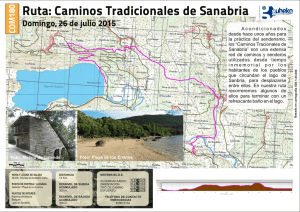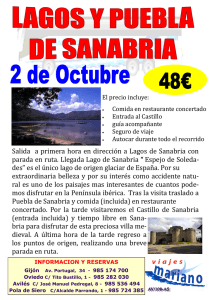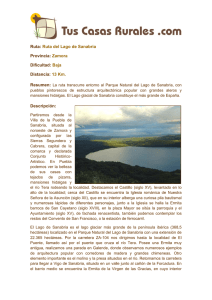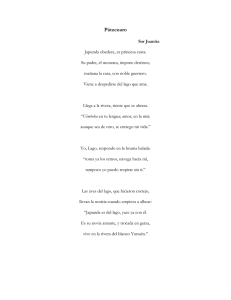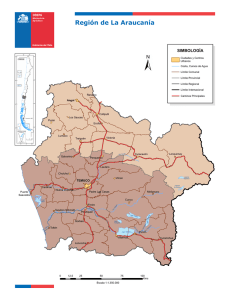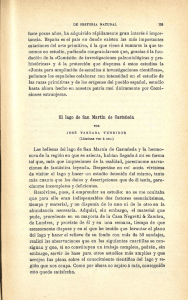LA RUPTURA DEL EQUILIBRIO ECOLÓGICO EN EL LAGO DE
Anuncio
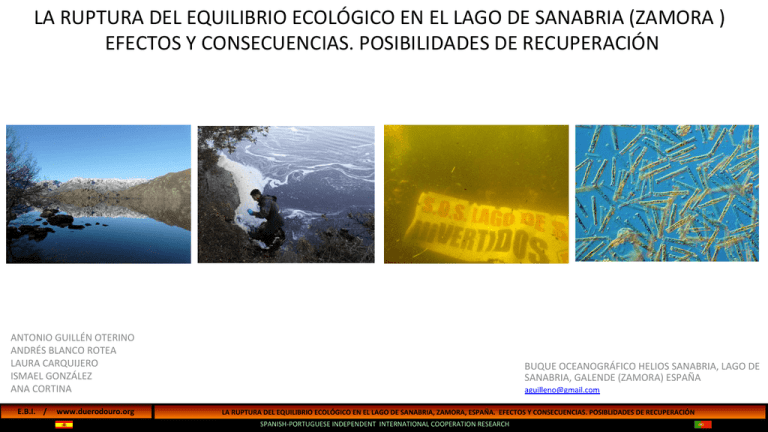
LA RUPTURA DEL EQUILIBRIO ECOLÓGICO EN EL LAGO DE SANABRIA (ZAMORA ) EFECTOS Y CONSECUENCIAS. POSIBILIDADES DE RECUPERACIÓN ANTONIO GUILLÉN OTERINO ANDRÉS BLANCO ROTEA LAURA CARQUIJERO ISMAEL GONZÁLEZ ANA CORTINA E.B.I. / www.duerodouro.org BUQUE OCEANOGRÁFICO HELIOS SANABRIA, LAGO DE SANABRIA, GALENDE (ZAMORA) ESPAÑA [email protected] LA RUPTURA DEL EQUILIBRIO ECOLÓGICO EN EL LAGO DE SANABRIA, ZAMORA, ESPAÑA. EFECTOS Y CONSECUENCIAS. POSIBLIDADES DE RECUPERACIÓN SPANISH-PORTUGUESE INDEPENDENT INTERNATIONAL COOPERATION RESEARCH ¿Cambios naturales o antropogénicos? El Lago de Sanabria es el principal Lago de origen glaciar de la Península Ibérica, se trata de un frágil ecosistema que pertenece a la red Natura 2000 y que cuenta además con las figuras complementarias de protección LIC y ZEPA. Desde el año 2012 la EBI Fondos del Lago junto a Isla de Moras, primavera de 2013 frente a primavera de 2014 viene alertando de los profundos cambios que le afectan. Los cambios experimentados en las aguas del Lago de Sanabria ¿son consecuencia de una dinámica natural o tienen su origen en un proceso antropogénico? E.B.I. / www.duerodouro.org Infección de quitridios sobre poblaciones de Tabellaria y de Saprolegnia en peces LA RUPTURA DEL EQUILIBRIO ECOLÓGICO EN EL LAGO DE SANABRIA, ZAMORA, ESPAÑA. EFECTOS Y CONSECUENCIAS. POSIBLIDADES DE RECUPERACIÓN SPANISH-PORTUGUESE INDEPENDENT INTERNATIONAL COOPERATION RESEARCH INTRODUCCIÓN Año 2012: la Estación Biológica Internacional Duero-Douro inició su trabajo de investigación con la finalidad de divulgar los valores naturales del Lago de Sanabria y realizar actividades de educación ambiental en su entorno. En el desarrollo de este trabajo se empezaron a detectar fenómenos impropios de este ecosistema y más adelante profundas transformaciones que afectan su estado trófico. Estos cambios, que en los últimos meses se suceden a gran velocidad, suponen una ruptura del equilibrio ecológico y son consecuencia de un proceso de eutrofización al que, de no ponerse un remedio efectivo, comprometerá de forma grave la supervivencia de este sensible y único ecosistema peninsular y el disfrute de este enclave único por parte de las generaciones futuras. E.B.I. / www.duerodouro.org La labor divulgativa que se desarrolla desde la EBI tiene su origen en el trabajo de investigación y experimentación que se realiza en su entorno LA RUPTURA DEL EQUILIBRIO ECOLÓGICO EN EL LAGO DE SANABRIA, ZAMORA, ESPAÑA. EFECTOS Y CONSECUENCIAS. POSIBLIDADES DE RECUPERACIÓN SPANISH-PORTUGUESE INDEPENDENT INTERNATIONAL COOPERATION RESEARCH METODOLOGÍA: GENERALIDADES Desde el año 2012, principalmente a bordo del buque oceanográfico Helios Sanabria, los investigadores de la EBI vienen realizando el seguimiento en este ecosistema lacustre, un seguimiento prácticamente diario que comprende: 1-Realización de inmersiones en cada jornada para efectuar el reconocimiento directo del estado del agua y los fondos. Todas estas inmersiones son grabadas y se almacenan en una base de datos 2- Mediciones semanales de transparencia con disco de Secchi en tres puntos diferentes 3- Análisis semanales con testers mutiparamétricos de valores de pH, colorimetría, conductividad, DBO, oxígeno disuelto, fósforo/fosfatos y nitratos/nitritos 4- Muestreos y estudios semanales de fitoplancton, fitobentos y zooplancton siguiendo protocolos estandarizados de la DMA, además de otros complementarios tanto en la zona fótica como en puntos de profundidad controlada muestreados con bomba de filtrado selectivo desarrollada íntegramente por la EBI. 5- Muestreo semestral de sedimentos en trampas de sedimentación a través de toma directa en inmersión. E.B.I. / www.duerodouro.org Toma de muestras en inmersión Toma de muestras con botella hidrográfrica Análisis con téster multiparamétrico LA RUPTURA DEL EQUILIBRIO ECOLÓGICO EN EL LAGO DE SANABRIA, ZAMORA, ESPAÑA. EFECTOS Y CONSECUENCIAS. POSIBLIDADES DE RECUPERACIÓN SPANISH-PORTUGUESE INDEPENDENT INTERNATIONAL COOPERATION RESEARCH METODOLOGÍA: VENTAJAS DE LA UTILIZACIÓN DE MEDIOS COMPLEMENTARIOS Los medios tecnológicos de última generación con los que cuenta la EBI y el hecho de poder realizar un seguimiento en el Lago de forma continuada y a lo largo de todo el año posibilitan el tener un conocimiento preciso y en tiempo real de cuál es el estado de este ecosistema. La realización de muestreos mediante sistemas complementarios a los establecidos por la DMA permite un conocimiento mucho más exhaustivo y real de este ecosistema. El empleo de técnicas de estudio microscópico basadas en la observación de material vivo mediante microscopía de contraste de fase, contraste de interferencia, epifluorescencia y campo oscuro junto con el registro fotográfico y de vídeo ha permitido obtener un valioso registro documental inédito hasta ahora. Todos estos elementos tecnológicos y su utilización mejoran sustancialmente metodologías estandarizadas, pues se ajustan de manera precisa al ecosistema para el que se han diseñado E.B.I. / www.duerodouro.org Desde el buque de investigación oceanográfico se utilizan y se han desarrollado novedosos sistemas de investigación que mejoran los protocolos estandarizados y permiten tener un conocimiento más detallado y preciso del estado ecológico del Lago Gonyostomum semen, EBI Gonyostomum semen, MAGRAMA Los métodos de observación y registro de fitoplancton y zooplancton utilizados desde la EBI mejoran los habitualmente empleados en este tipo de investigaciones LA RUPTURA DEL EQUILIBRIO ECOLÓGICO EN EL LAGO DE SANABRIA, ZAMORA, ESPAÑA. EFECTOS Y CONSECUENCIAS. POSIBLIDADES DE RECUPERACIÓN SPANISH-PORTUGUESE INDEPENDENT INTERNATIONAL COOPERATION RESEARCH RESULTADOS- I • • • • E.B.I. / En algo más de 18 meses se han citado para este ecosistema más de 40 nuevos taxones de algas bentónicas y planctónicas -más del 30% del total conocido hasta hace dos años- más del 99% de protozoos y un porcentaje menos elevado de pequeños organismos pluricelulares. Todas estas aportaciones se recogen y publican en la galería de "Mundo Microscópico" de la plataforma "Biodiversidad Virtual", en la galería de "Proyecto Agua" y en la página web de EOL. Se ha podido determinar la escasa validez de la medición de la clorofila a para establecer el estado trófico en este ecosistema. Se han diagnosticado todo un conjunto de cambios en el ecosistema y encontrado los principales elementos desencadenantes. Se han descubierto en este ecosistema dinámicas tróficas hasta ahora inéditas en él: mixotrofia en Tabellaria, parasitismo de quitridiales y mecanismos de “micro loop” que afectan a la dinámica del fitoplancton y zooplancton www.duerodouro.org LA RUPTURA DEL EQUILIBRIO ECOLÓGICO EN EL LAGO DE SANABRIA, ZAMORA, ESPAÑA. EFECTOS Y CONSECUENCIAS. POSIBLIDADES DE RECUPERACIÓN SPANISH-PORTUGUESE INDEPENDENT INTERNATIONAL COOPERATION RESEARCH RESULTADOS- II De especial relevancia son hallazgos inéditos en relación con la biología de la diatomea Tabellaria fenestrata en el Lago, particularmente su comportamiento mixotrófico y la respuesta a diferentes clases de nutrientes orgánicos, sus movimientos en la columna de agua, su papel en el bentos así como su reproducción. Todos estos factores están relacionados con su dominancia y con su fulminante desaparición de la zona fótica hace unas semanas como consecuencia de la invasión de un quitridio que ha esquilmado su población provocando nuevos cambios de consecuencias imprevisibles. E.B.I. / www.duerodouro.org Espectrometría de absorción de Tabellaria fenestrata y picos de absorción para la clorofila a Tabellaria fenestrata forma filamentos en el fondo Tabellaria fenestrata tras un año en ausencia de luz Tabellaria fenestrata infectada por Zygorhizidium LA RUPTURA DEL EQUILIBRIO ECOLÓGICO EN EL LAGO DE SANABRIA, ZAMORA, ESPAÑA. EFECTOS Y CONSECUENCIAS. POSIBLIDADES DE RECUPERACIÓN SPANISH-PORTUGUESE INDEPENDENT INTERNATIONAL COOPERATION RESEARCH RESULTADOS III : LAS VARIACIONES EN LA COMPOSCIÓN DEL FITOPLANCTON La composición del fitoplancton en el Lago ha experimentado una transformación radical que ha venido marcada por los siguientes episodios: 1º Estabilidad y diversidad hasta 2012 2º Inicio de la dominancia de Tabellaria fenestrata que en verano y septiembre de 2012 alcanza el 75% del biovolumen total 3º Incremento de la dominancia de esta especie y florecimiento masivo con concentraciones de células superiores a 3000 cel/ml y representación de más del 99% del biovolumen en 2013 y 2014 (1) 4º Desaparición casi total de esta diatomea de la zona fótica en mayo de 2014 por la infección de un quitridio del género Zygorhizidum y precipitación de toda la biomasa de la zona fótica (2) 5º Reajuste del equilibrio con floración masiva de Coenocystis planctonica (3) (1) (2) (3) E.B.I. / www.duerodouro.org LA RUPTURA DEL EQUILIBRIO ECOLÓGICO EN EL LAGO DE SANABRIA, ZAMORA, ESPAÑA. EFECTOS Y CONSECUENCIAS. POSIBLIDADES DE RECUPERACIÓN SPANISH-PORTUGUESE INDEPENDENT INTERNATIONAL COOPERATION RESEARCH RESULTADOS IV : ALTERACIÓNES EN EL BENTOS Si los cambios que afectan al fitoplancton pueden calificarse de radicales, también lo han sido los de la flora bentónica y el perifiton. Además de la pérdida de la transparencia del agua debida a la turbidez y a la su coloración verdosa, los fondos, antes absolutamente limpios, se han visto cubiertos desde principios de 2013 por masas de algas microscópicas que crecen agrupadas dando lugar a estructuras filamentosas de consistencia gelatinosa y de composición muy variada Entre las algas que forman esas masas ocupa un lugar destacado Tabellaria fenestrata que se reproduce en el fondo formando agrupaciones coloniales de hasta más de 100 individuos, junto a ella crecen formando estas estructuras Spirogyra, Mougeotia, Zygnema, Bulbochaete, etc. En los últimos meses todo el fondo del lago en la zona fótica está empezando a cubrirse por densas formaciones de Nitella flexilis E.B.I. / www.duerodouro.org Evolución del fondo del Lago de Sanabria desde marzo de 2013 a marzo de 2014 Formaciones filamentos con Spirogyra, Mougeotia, Zygnema, Gomphonema y Bulbochaete Detalle de Nitella flexilis la charácea que actualmente invade de los fondos LA RUPTURA DEL EQUILIBRIO ECOLÓGICO EN EL LAGO DE SANABRIA, ZAMORA, ESPAÑA. EFECTOS Y CONSECUENCIAS. POSIBLIDADES DE RECUPERACIÓN SPANISH-PORTUGUESE INDEPENDENT INTERNATIONAL COOPERATION RESEARCH RESULTADOS V : ALTERACIÓN DE LOS PARÁMETROS FÍSICO QUÍMICOS Disminución de la transparencia llegando a MÁXIMOS límites 2,86 m, coloración verdosa, aumento de las MÍNIMOS concentraciones de fósforo, aumento del pH, aumento de la conductividad, aumento de la concentración de nitritos en los fondos son hechos Evolución de valores de pH constatados en los últimos tiempos y reflejados en las siguientes gráficas elaboradas con datos de la administración, de laboratorios independientes y de la propia EBI y que constatan lo que ya es evidente cuando se observa el agua del Lago: su degradación. MÁXIMOS MÁXIMOS MÍNIMOS Evolución de valores conductividad S/cm Variación de niveles de fósforo total en mg/l E.B.I. / www.duerodouro.org MÍNIMOS Evolución niveles de OD mg O2 /L MÁXIMOS MÍNIMOS Evolución transparencia DS en m. LA RUPTURA DEL EQUILIBRIO ECOLÓGICO EN EL LAGO DE SANABRIA, ZAMORA, ESPAÑA. EFECTOS Y CONSECUENCIAS. POSIBLIDADES DE RECUPERACIÓN SPANISH-PORTUGUESE INDEPENDENT INTERNATIONAL COOPERATION RESEARCH RESULTADOS VI : VARIACIONES EN LA COMPOSICIÓN DEL ZOOPLANCTON Y ALTERACIÓN DEL REGISTRO SEDIMENTARIO Zooplancton: Episodios inéditos de dominancia absoluta de Bosmina longirostris y en la actualidad de Holopedium gibberum Mientras que a lo largo de todo el registro sedimentario del Lago de Sanabria, Tabellaria nunca ha alcanzado valores superiores al 6,43% , del total de diatomeas (Luque Marín, 2003) hoy se encuentra en concentraciones superiores al 70% en la capa superficial de sedimentos. ( Este de la Isla de Moras, 15 m. noviembre de 2013) E.B.I. / www.duerodouro.org Bosmina longirostris (izquierda) ha llegado a representar hasta el 75% de los individuos en el zooplancton durante varios meses en 2013 y ha sido desplazada recientemente por Holopedium gibberum (centro y derecha) en 2014 Frústulos de Tabellaria en sedimento LA RUPTURA DEL EQUILIBRIO ECOLÓGICO EN EL LAGO DE SANABRIA, ZAMORA, ESPAÑA. EFECTOS Y CONSECUENCIAS. POSIBLIDADES DE RECUPERACIÓN SPANISH-PORTUGUESE INDEPENDENT INTERNATIONAL COOPERATION RESEARCH RESULTADOS VII: CONSTATACIÓN DE LOS CAMBIOS, INFORMES INDEPENDIENTES . Colegio Oficial de Farmacéuticos Laboratorio Phytolab Euroestudios Acta notarial La EBI ha desarrollado un trabajo de investigación alertando de la situación a las autoridades que desde abril de 2012, siguen haciendo oídos sordos al problema de deterioro del Lago del que son responsables. El INFORME DE EUROESTUDIOS, encargado por la propia administración regional y ocultado por ella, contiene información clave acerca de cuáles son los nutrientes que llegan al Lago afectando a su estado trófico y cuál es su procedencia. Las analíticas de los LABORATORIOS DEL COLEGIO OFICIAL DE FARMACEÚTICOS recogen valores de fósforo y otras condiciones impropias de un ecosistema oligotrófico, también los estudios de LABORATORIOS LIMNOLÓGICOS INDEPENDIENTES reflejan los mismos cambios detectados por la EBI que han quedado constatados en UN ACTA NOTARIAL que da fe de todo este proceso de cambio que interesadamente se pretende ocultar E.B.I. / www.duerodouro.org LA RUPTURA DEL EQUILIBRIO ECOLÓGICO EN EL LAGO DE SANABRIA, ZAMORA, ESPAÑA. EFECTOS Y CONSECUENCIAS. POSIBLIDADES DE RECUPERACIÓN SPANISH-PORTUGUESE INDEPENDENT INTERNATIONAL COOPERATION RESEARCH RESULTADOS: EL FACTOR ANTRÓPICO FRENTE A LAS CAUSAS NATURALES Navaladelpozo, izquierda y Lago de Sanabria, derecha, marzo de 2014 Mapa de localización de vertidos de aguas fecales/residuales Llama la atención como todo este cambio profundo que afecta al Lago, tanto a la propia masa del agua y a los seres vivos que habitan en ella, como a los que habitan en el fondo, sea para algunos consecuencia del cambio climático o de otros factores desconocidos, cuando pocos metros más arriba, en la propia cuenca del Tera, masas de agua como Navaldelpozo no parecen ser sensibles a esos cambios ni se han visto afectados por ellos, manteniendo sus condiciones de oligotrofia originales. Es cierto que en este proceso de cambio, podrían concurrir causas naturales desconocidas e incluso sobrenaturales, pero hay unas evidencias tan ciertas como éstas: - Vertidos de aguas sin depurar desde que en 2004 con fondos europeos se construyeran depuradoras que no depuran - Existencia de 5 puntos de vertido de aguas fecales y residuales, puntos denominados por la CHD “EDAR” como los siguientes - Vertidos esporádicos que forman espumas con alto contenido en fósforo y que nada tienen que ver con acúmulos de polen E.B.I. / www.duerodouro.org LA RUPTURA DEL EQUILIBRIO ECOLÓGICO EN EL LAGO DE SANABRIA, ZAMORA, ESPAÑA. EFECTOS Y CONSECUENCIAS. POSIBLIDADES DE RECUPERACIÓN SPANISH-PORTUGUESE INDEPENDENT INTERNATIONAL COOPERATION RESEARCH EL ORIGEN DEL PROBLEMA Y LAS SOLUCIONES El proceso de la eutrofización del Lago puede comenzar a solucionarse cuando se resuelva el problema de la depuración de las aguas que vierten en él y que en el Lago de Sanabria falla de manera íntegra (informe de Euroestudios, 2008). Una vez resuelto el problema de los aportes de aguas fecales y residuales, la Naturaleza podrá comenzar a recuperase E.B.I. / www.duerodouro.org Algunas imágenes de zonas de vertido izquierda y centro y de red de saneamiento, derecha Vertidos con alto contenido en fósforo (IV-2014) y aspecto general de zona de vertidos con desarrollo masivo de Leptothrix LA RUPTURA DEL EQUILIBRIO ECOLÓGICO EN EL LAGO DE SANABRIA, ZAMORA, ESPAÑA. EFECTOS Y CONSECUENCIAS. POSIBLIDADES DE RECUPERACIÓN SPANISH-PORTUGUESE INDEPENDENT INTERNATIONAL COOPERATION RESEARCH CONCLUSIONES Los cambios que afectan al Lago de Sanabria son profundos y múltiples: • El enriquecimiento en nutrientes del agua como consecuencia de los aportes de unos sistemas de depuración obsoletos, una red de saneamiento ruinosa, la existencia de vertidos continuados de aguas fecales y residuales, además de otros vertidos esporádicos, están en el origen de su proceso de eutrofización. • La eutrofización de las aguas del Lago ha generado una ruptura del equilibrio ecológico, una profunda alteración en la composición de la biocenosis de este ecosistema, una pérdida de biodiversidad grave, un cambio radical en los fondos y la alteración de la mayoría de los parámetros físico-químicos de este Espacio Natural. • Si no se pone freno pronto a todo lo que está en el origen del deterioro del Lago de Sanabria perderemos uno de los ecosistemas más singulares y hermosos de nuestro país e hipotecaremos el futuro las generaciones venideras, que también tiene derecho a disfrutar y conocer un Lago como el que describió Unamuno: "Era alto, delgado, erguido, llevaba la cabeza como nuestra Peña del Buitre lleva su cresta y había en sus ojos toda la hondura azul de nuestro Lago " (Miguel de Unamuno, 1930) E.B.I. / www.duerodouro.org LA RUPTURA DEL EQUILIBRIO ECOLÓGICO EN EL LAGO DE SANABRIA, ZAMORA, ESPAÑA. EFECTOS Y CONSECUENCIAS. POSIBLIDADES DE RECUPERACIÓN SPANISH-PORTUGUESE INDEPENDENT INTERNATIONAL COOPERATION RESEARCH THE DISRUPTION OF THE ECOLOGICAL BALANCE IN SANABRIA LAKE (ZAMORA). EFFECTS AND CONSEQUENCES.RECOVERY ANTONIO GUILLÉN OTERINO ANDRÉS BLANCO ROTEA LAURA CARQUIJERO ISMAEL GONZÁLEZ ANA CORTINA E.B.I. / www.duerodouro.org BUQUE OCEANOGRÁFICO HELIOS SANABRIA, LAGO DE SANABRIA, GALENDE (ZAMORA) ESPAÑA [email protected] LA RUPTURA DEL EQUILIBRIO ECOLÓGICO EN EL LAGO DE SANABRIA, ZAMORA, ESPAÑA. EFECTOS Y CONSECUENCIAS. POSIBLIDADES DE RECUPERACIÓN SPANISH-PORTUGUESE INDEPENDENT INTERNATIONAL COOPERATION RESEARCH Natural or human interference? Sanabria Lake is the most important glacial lake in the Iberian Peninsula. It is a fragile ecosystem that belongs to ‘’ red Natura 2000’’ and, it is also additionally protected by LIC and ZEPA. Since 2012 the EBI has been Funds with Island Lake Moras, spring 2013 versus spring 2014 warning about the profound changes it is undergoing. But are all these changes Sanabria lake’s water is experiencing a consequence of a natural process or are they the result of human interference? Chytrid infection Tabellaria Stocks and Saprolegnia on fish E.B.I. / www.duerodouro.org LA RUPTURA DEL EQUILIBRIO ECOLÓGICO EN EL LAGO DE SANABRIA, ZAMORA, ESPAÑA. EFECTOS Y CONSECUENCIAS. POSIBLIDADES DE RECUPERACIÓN SPANISH-PORTUGUESE INDEPENDENT INTERNATIONAL COOPERATION RESEARCH INTRODUCTION Year 2012: The International Biological Station Duero-Douro started its research Project with the purpose of revealing all the natural values of Sanabria Lake and also carrying out environmental education activities in its surroundings, where profound transformations, that affect its trophic state, have been detected. These changes, that in the past few months have been happening faster and faster, represent a disruption of the ecological balance and are the result of an eutrophication process. If we do not take effective measures, this will endanger the survival of this fragile and unique ecosystem in the Iberian Peninsula, in addition of depriving future generations of the possibility of enjoying this one of a kind spot. E.B.I. / www.duerodouro.org The informative work that develops from the EBI has its origin in the work research and testing that is performed in your environment LA RUPTURA DEL EQUILIBRIO ECOLÓGICO EN EL LAGO DE SANABRIA, ZAMORA, ESPAÑA. EFECTOS Y CONSECUENCIAS. POSIBLIDADES DE RECUPERACIÓN SPANISH-PORTUGUESE INDEPENDENT INTERNATIONAL COOPERATION RESEARCH METHODOLOGY I • • • • • E.B.I. / Since 2012, EBI researchers, mainly on board of the oceanographic ship Helios Sanabria, have been tracking this lake ecosystem, almost on a daily basis which consists of: 1-Making daily dives to run live tests of the water condition and the bottom of the lake. All these immersions are recorded and stored in a database 2 - Weekly Measurements of the turbidity with a Secchi disk at three different points 3 - weekly mutiparametric analysis with pH probe, colorimetry, conductivity, BOD, dissolved oxygen, phosphate / phosphate and nitrate / nitrite 4 - Weekly Sampling and studies of phytoplankton and zooplankton following standardized Phytobenthos WFD, and additional extra ones both in the photic zone and the controlled depth points sampled with selective filtering pump entirely developed by the EBI protocols. 5 – Six month Sampling of sediments in sediment traps through direct sampling www.duerodouro.org Multiparameter analysis tester Sampling bottle Niskin Sampling immersion LA RUPTURA DEL EQUILIBRIO ECOLÓGICO EN EL LAGO DE SANABRIA, ZAMORA, ESPAÑA. EFECTOS Y CONSECUENCIAS. POSIBLIDADES DE RECUPERACIÓN SPANISH-PORTUGUESE INDEPENDENT INTERNATIONAL COOPERATION RESEARCH METHODOLOGY: ADVANTAGES OF USING SUPPLEMENTAL MEDIA The state-of-the-art technological tools, that the EBI has as well as the opportunity of being able to track the lake on a regular basis throughout the year give us the opportunity to have a precise knowledge in real time of the state of the ecosystem. Making sampling with systems additional to those established by DMA allow us to have a more accurate and real knowledge of this ecosystem. The use of microscope techniques based on the observation of alive material by phase contrast microscopy, interference contrast, darkfield and epifluorescence with photographic and video recording has allowed us to have a valuable documentary record, unknown so far. All these technological elements and their use substantially improve the standardized methods, since they accurately conform to the ecosystem the have been designed for. E.B.I. / www.duerodouro.org From the oceanographic research vessel used and have developed innovative systems that improve standardized research protocols and allow you to have a more detailed and accurate knowledge of the ecological status of Lake Gonyostomum semen, EBI Gonyostomum semen, MAGRAMA The methods of observation and recording of phytoplankton and zooplankton used since EBI improve commonly used in this type of research LA RUPTURA DEL EQUILIBRIO ECOLÓGICO EN EL LAGO DE SANABRIA, ZAMORA, ESPAÑA. EFECTOS Y CONSECUENCIAS. POSIBLIDADES DE RECUPERACIÓN SPANISH-PORTUGUESE INDEPENDENT INTERNATIONAL COOPERATION RESEARCH RESULTS- I •In just over 18 months over 40 new taxa of benthic and planktonic-over 30% of total algae known until two years ago-, more than 99% of protozoa and a lower percentage of small multicellular organisms have been cited for this ecosystem . All these contributions are collected and published in the gallery "Mundo Microscópico" from the "Biodiversidad Virtual" platform in the gallery ‘’Proyecto Agua" and EOL website. •It was possible to determine the limited validity of the measurement of chlorophyll to establish the trophic status of this ecosystem. •A whole set of changes in the ecosystem have been diagnosed with and the main triggers have been found. •Trophic dynamics, hitherto unknown in it , have been discovered in this ecosystem: mixotrophy in Tabellaria, parasitism by chytrids and "micro loop" mechanisms that affect the dynamics of phytoplankton and zooplankton E.B.I. / www.duerodouro.org LA RUPTURA DEL EQUILIBRIO ECOLÓGICO EN EL LAGO DE SANABRIA, ZAMORA, ESPAÑA. EFECTOS Y CONSECUENCIAS. POSIBLIDADES DE RECUPERACIÓN SPANISH-PORTUGUESE INDEPENDENT INTERNATIONAL COOPERATION RESEARCH RESULTS- II Of particular relevance are the amazing findings related to the biology of diatom Tabellaria fenestrata in the Lake, particularly its mixotrophic behavior and its response to different classes of organic nutrients, their movements in the water column, their role in the benthos and their reproduction. All these factors are related to its dominance and its sudden disappearance of the photic zone a few weeks ago as a result of the invasion of a chytrid which has depleted its population causing further changes with unpredictable consequences. E.B.I. / www.duerodouro.org Tabellaria absorption spectrometry fenestrata and absorption peaks for chlorophyll a Tabellaria fenestrata after a year in absence of light Tabellaria fenestrata form filaments in the background Tabellaria fenestrata infected Zygorhizidium LA RUPTURA DEL EQUILIBRIO ECOLÓGICO EN EL LAGO DE SANABRIA, ZAMORA, ESPAÑA. EFECTOS Y CONSECUENCIAS. POSIBLIDADES DE RECUPERACIÓN SPANISH-PORTUGUESE INDEPENDENT INTERNATIONAL COOPERATION RESEARCH RESULTS III : CHANGES IN THE COMPOSITION OF PHYTOPLANKTON The composition of phytoplankton in the lake has undergone a radical transformation that has been marked by the following events: •First: Stability and diversity until 2012 . •2nd: the beginning of Tabellaria fenestrata dominance which in summer and September 2012 reached 75% of the total biovolume •3rd An Increased dominance of this species and the mass flowering of cell concentrations above 3000 cells / ml (1) which represent more than 99% of the biovolume in 2013 and 2014 •4th almost total disappearance of this diatom from the photic zone in May 2014 by a chytrid infection Zygorhizidum (2) gender and the precipitation of all biomass of the photic zone •5th Readjustment (3) of the balance with massive planktonic blooms Coenocystis (1) (2) (3) E.B.I. / www.duerodouro.org LA RUPTURA DEL EQUILIBRIO ECOLÓGICO EN EL LAGO DE SANABRIA, ZAMORA, ESPAÑA. EFECTOS Y CONSECUENCIAS. POSIBLIDADES DE RECUPERACIÓN SPANISH-PORTUGUESE INDEPENDENT INTERNATIONAL COOPERATION RESEARCH RESULTS IV : ALTERATIONS IN BENTOS If changes affecting phytoplankton can be described as radical, can also be the ones of the benthic flora and periphyton. Besides the loss of water clarity due to turbidity and its greenish color, the bottom, absolutely clean before, since the beginning of 2013 have been covered by masses of microscopic algae growing grouped resulting in jelly-like filamentous structures of varied composition Among the algae that form these masses Tabellaria fenestrata has a prominent place. Played in the background forming colonial groups to over 100 individuals, with it Spirogyra, Mougeotia, Zygnema, Bulbochaete, etc.. grow into these structures Recently the bottom of the lake in the photic zone is starting to be covered by dense formations of Nitella flexilis E.B.I. / www.duerodouro.org Evolution of the bottom of Lake Sanabria from March 2013 to March 2014 Formations Spirogyra filaments, Mougeotia, Zygnema, Gomphonema and Bulbochaete Extreme Nitella flexilis the characeae invades currently funds LA RUPTURA DEL EQUILIBRIO ECOLÓGICO EN EL LAGO DE SANABRIA, ZAMORA, ESPAÑA. EFECTOS Y CONSECUENCIAS. POSIBLIDADES DE RECUPERACIÓN SPANISH-PORTUGUESE INDEPENDENT INTERNATIONAL COOPERATION RESEARCH RESULTS V : ALTERATION OF PHYSICAL- CHEMICAL PARAMETERS A decrease in transparency reaching limits of 2.86 m, greenish colour, increased concentrations of phosphorus, increased pH, increased conductivity, increasing in the concentration of nitrite in the bottom are facts found in recent times and reflected in the following graphs made with data of the government, of independent laboratories and the own EBI that confirm what is already evident when the water of the lake is observed: its degradation MÁXIMOS MÁXIMOS MÍNIMOS MÁXIMOS MÍNIMOS Evolution of pH values Evolution of conductivity values S/cm www.duerodouro.org Evolution DO levels mg O2 /L MÁXIMOS MÍNIMOS Changes in levels of total phosphorus in mg / l E.B.I. / MÍNIMOS Evolution transparency DS in m. LA RUPTURA DEL EQUILIBRIO ECOLÓGICO EN EL LAGO DE SANABRIA, ZAMORA, ESPAÑA. EFECTOS Y CONSECUENCIAS. POSIBLIDADES DE RECUPERACIÓN SPANISH-PORTUGUESE INDEPENDENT INTERNATIONAL COOPERATION RESEARCH RESULTS VI : VARIACIONES EN LA COMPOSICIÓN DEL ZOOPLANCTON Y ALTERACIÓN DEL REGISTRO SEDIMENTARIO •Zooplankton: Unpublished Episodes of absolute dominance of Bosmina longirostris and currently of Holopedium gibberum •While throughout the sedimentary record of Sanabria Lake, Tabellaria has never reached values higher than 6.43%, of total diatoms (Luque Marin, 2003) is currently in concentrations higher than 70% in the surface layer of sediment. (East Moras Islands , 15 m. November 2013) E.B.I. / www.duerodouro.org Bosmina longirostris (left) has come to represent up to 75% of individuals in zooplankton for several months in 2013 and has recently been displaced by Holopedium gibberum (center and right) in 2014 Tabellaria sediment LA RUPTURA DEL EQUILIBRIO ECOLÓGICO EN EL LAGO DE SANABRIA, ZAMORA, ESPAÑA. EFECTOS Y CONSECUENCIAS. POSIBLIDADES DE RECUPERACIÓN SPANISH-PORTUGUESE INDEPENDENT INTERNATIONAL COOPERATION RESEARCH RESULTS VII: FINDING OF CHANGES, INDEPENDENT REPORTS. College of Pharmacy LaboratoryPhytolab Euroestudios Affidavit The EBI has developed a research warning the authorities about the situation who, since April 2012, have been ignoring the problem of deterioration of the lake for which they are responsible. The EUROESTUDIOS REPORT commissioned and at the same time hidden by the own regional administration, contains key information about what nutrients are getting to the lake affecting its trophic status and what their origin is. Analytical LABS of the COLEGIO OFICIAL DE FARMACEÚTICOS Spanish PHARMACEUTICAL ORGANIZATION collect phosphorus values and other improper conditions of an oligotrophic ecosystem, also limnological studies of INDEPENDENT LABORATORIES reflect the same changes detected by the EBI that have been observed in an affidavit attesting this process of change that the administration is so interested in hiding. E.B.I. / www.duerodouro.org LA RUPTURA DEL EQUILIBRIO ECOLÓGICO EN EL LAGO DE SANABRIA, ZAMORA, ESPAÑA. EFECTOS Y CONSECUENCIAS. POSIBLIDADES DE RECUPERACIÓN SPANISH-PORTUGUESE INDEPENDENT INTERNATIONAL COOPERATION RESEARCH RESULTS: ANTROPHIC FACTOR FROM NATURAL CAUSES Navaladelpozo, Lake Sanabria left, right, March 2014 Location map for discharges of fecal / sewage It really attracts attention how all this profound change affecting the Lake, both the actual mass of water and the creatures that inhabit it, and those who live in the bottom, are for some the result of climate change or other unknown factors when few meters above in the Tera river itself, water bodies as Navaldelpozo seem no to be affected by these changes or have been affected by them, keeping their original oligotrophic conditions. It is true that in this process of change natural or even supernatural unknown causes might have appeared, but considering there are some clear evidences: •Discharges of untreated sewage since 2004 treatment plants, which have never worked, were built with European funds. •Existence of 5 points of discharge of sewage and waste, called points for CHD ‘’EDAR" and they are like this •Sporadic discharges forming foams with high phosphorus content and have nothing to do with pollen E.B.I. / www.duerodouro.org LA RUPTURA DEL EQUILIBRIO ECOLÓGICO EN EL LAGO DE SANABRIA, ZAMORA, ESPAÑA. EFECTOS Y CONSECUENCIAS. POSIBLIDADES DE RECUPERACIÓN SPANISH-PORTUGUESE INDEPENDENT INTERNATIONAL COOPERATION RESEARCH THE ORIGIN OF THE PROBLEM AND SOLUTIONS The process of eutrophication of Lake can begin to be solved when the problem of purification of water discharging into it be solved and this completely fails at Sanabria Lake (Euroestudios report, 2008). Algunas imágenes de zonas de vertido izquierda y centro y de red de saneamiento, derecha Vertidos con alto contenido en fósforo (IV-2014) y aspecto general de zona de vertidos con desarrollo masivo de Leptothrix Once the problem of the contributions of fecal and sewage is solved, Nature can begin to recover. E.B.I. / www.duerodouro.org LA RUPTURA DEL EQUILIBRIO ECOLÓGICO EN EL LAGO DE SANABRIA, ZAMORA, ESPAÑA. EFECTOS Y CONSECUENCIAS. POSIBLIDADES DE RECUPERACIÓN SPANISH-PORTUGUESE INDEPENDENT INTERNATIONAL COOPERATION RESEARCH CONCLUSIONS •There are profound and multiple changes that affect Lake Sanabria. •Nutrient enrichment of water as a result of obsolete systems debugging, a network of dilapidated sanitation, the existence of continued dumping of sewage and wastewater discharges are sporadic and the origin of the process of eutrophication. •Eutrophication of the lake has generated a disruption of the ecological balance, a profound alteration in the composition of the biocenosis of this ecosystem, severe loss of biodiversity, a radical change in the bottom and has altered most of the physical chemical parameters in this Natural Area. •If we don’t stop everything that it is originating this process of deterioration of Sanabria Lake we will lose one of the most unique and beautiful ecosystems in our country and we will ruin the future of future generations who also have the right to enjoy and learn from a Lake that Unamuno described the following way: He was tall, slender, erect, his head resembled the way our Peña del Buitre bears his crest and in his eyes we could see all the blue depth of our lake (Miguel de Unamuno, 1930) E.B.I. / www.duerodouro.org LA RUPTURA DEL EQUILIBRIO ECOLÓGICO EN EL LAGO DE SANABRIA, ZAMORA, ESPAÑA. EFECTOS Y CONSECUENCIAS. POSIBLIDADES DE RECUPERACIÓN SPANISH-PORTUGUESE INDEPENDENT INTERNATIONAL COOPERATION RESEARCH
